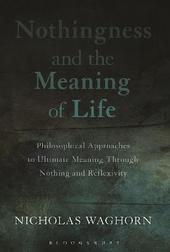
|
Nothingness and the Meaning of Life: Philosophical Approaches to Ultimate Meaning Through Nothing and Reflexivity
Hardback
Main Details
| Title |
Nothingness and the Meaning of Life: Philosophical Approaches to Ultimate Meaning Through Nothing and Reflexivity
|
| Authors and Contributors |
By (author) Nicholas Waghorn
|
| Physical Properties |
| Format:Hardback | | Pages:312 | | Dimensions(mm): Height 234,Width 156 |
|
| Category/Genre | Phenomenology and Existentialism |
|---|
| ISBN/Barcode |
9781472531810
|
| Classifications | Dewey:111 |
|---|
| Audience | | Professional & Vocational | |
|---|
|
Publishing Details |
| Publisher |
Bloomsbury Publishing PLC
|
| Imprint |
Bloomsbury Academic
|
| Publication Date |
28 August 2014 |
| Publication Country |
United Kingdom
|
Description
What is the meaning of life? Does anything really matter? In the past few decades these questions, perennially associated with philosophy in the popular consciousness, have rightly retaken their place as central topics in the academy. In this major contribution, Nicholas Waghorn provides a sustained and rigorous elucidation of what it would take for lives to have significance. Bracketing issues about ways our lives could have more or less meaning, the focus is rather on the idea of ultimate meaning, the issue of whether a life can attain meaning that cannot be called into question. Waghorn sheds light on this most fundamental of existential problems through a detailed yet comprehensive examination of the notion of nothing, embracing classic and cutting-edge literature from both the analytic and Continental traditions. Central figures such as Heidegger, Carnap, Wittgenstein, Nozick and Nagel are drawn upon to anchor the discussion in some of the most influential discussion of recent philosophical history. In the process of relating our ideas concerning nothing to the problem of life's meaning, Waghorn's book touches upon a number of fundamental themes, including reflexivity and its relation to our conceptual limits, whether religion has any role to play in the question of life's meaning, and the nature and constraints of philosophical methodology. A number of major philosophical traditions are addressed, including phenomenology, poststructuralism, and classical and paraconsistent logics. In addition to providing the most thorough current discussion of ultimate meaning, it will serve to introduce readers to philosophical debates concerning the notion of nothing, and the appendix engaging religion will be of value to both philosophers and theologians.
Author Biography
Nicholas Waghorn is Fellow and Director of Studies in Philosophy at St. Benet's Hall, and Tutor and Director of Studies in Philosophy at Blackfriars Hall, University of Oxford, UK.
ReviewsAt one level, it is refreshing to see clear, respectful but non-slavish expositions of key ideas in Heidegger, Carnap, Derrida, Searle, and Wittgenstein, among others. Waghorn moves with clarity and confidence between the Continental and Analytic traditions. At another level, his text reflects intellectual integrity, a refusal to question beg or dodge real impediments ... It is a pleasure to read his precise analyses of Heidegger's the nothing (das Nichts), and to see Waghorn tease out the key Carnapian replies ... This text would be most appreciated by readers of philosophy who can see the passion and honor within robust skepticism, the power of the mind to stab itself and not be deterred (or deferred) by the stab and the stabs to come. -- David Lee Stegall, Clemson University * Notre Dame Philosophical Reviews * Nicholas Waghorn provides a sustained and rigorous elucidation of what it would take for lives to have significance ... [The] book touches upon a number of fundamental themes, including reflexivity and its relation to our conceptual limits, whether religion has any role to play in the question of life's meaning, and the nature and constraints of philosophical methodology. * Oxford Philosophy Magazine, 2014 * Running with the compelling view that to enquire into the meaning of a person's life is to ask how it transcends limits, in this book Nicholas Waghorn seeks to understand the nature of meaningfulness 'all the way down', i.e., the unlimited. He critically explores the hypothesis that the best candidate for this, an unsurpassable kind of meaningfulness, is no-thing, no specifiable object or state of affairs. In doing so, Waghorn traverses difficult terrain concerning an ultimate kind of meaning in life that most of the contemporary philosophical literature has avoided in favour of more familiar, readily analyzable conditions. * Thaddeus Metz, Humanities Research Professor of Philosophy, University of Johannesburg, South Africa * Equally at home in the analytic and the continental traditions, Waghorn reflects on the elusive idea of nothingness by examining a wide range of intricate thinkers, including Heidegger, Derrida, Carnap, and Wittgenstein. He tackles his difficult subject with meticulous care, shows why no neat solutions are possible, and gives us much food for thought along the way. * John Cottingham, Professorial Research Fellow, Heythrop College, University of London, and Professor Emeritus, University of Reading. * Nicholas Waghorn's readings of the wide range of philosophers with whom he engages are impressive, as is his ability to elucidate the work of both 'analytic' and 'Continental' thinkers. * Journal of Moral Philosophy *
|